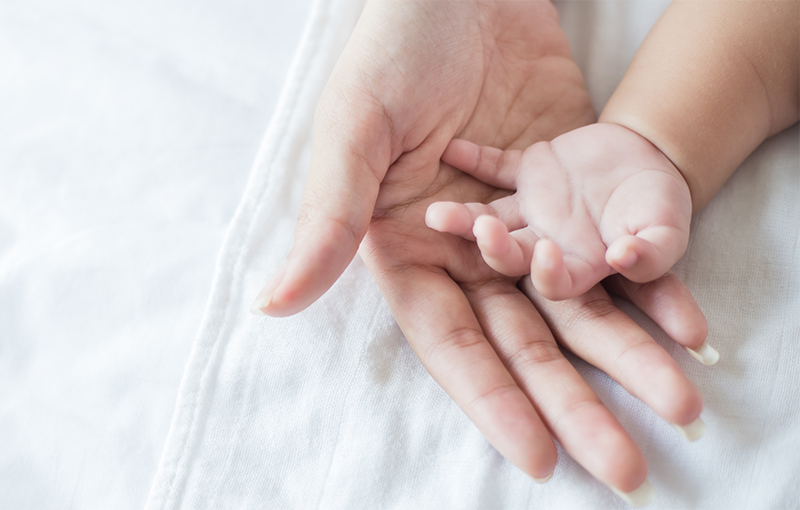Life Cycle
The Jewish people have always given special meaning and created special moments to mark the cycles of nature and of human life.

Each life cycle moment is a sacred event in time. From the joy of new life, to the expectation of marriage and the sorrow of losing a loved one, these moments bring us together. Our traditions give us the foundations for making our way through life with meaning. We infuse these traditions with creativity and love, reflecting the modern and liberal sensitivities that enrich our Jewish experiences as a Reform community.

Birth
The birth of a child is a moment of intense wonder and celebration. Jewish tradition creates a wonderful framework for welcoming children into the Covenant of Israel and bestowing upon them a Hebrew name.
Brit Milah
Since the time of Abraham & Sarah, we have been called as Jews to enter the covenant, as it is written: "Throughout your generations, every male among you shall be circumcised at eight days old." This is the entryway into a heritage as old as Abraham--as new as the promise of a young life.
On the 8th day Jewish tradition commands us to circumcise our sons. Larchmont Temple is happy to assist you in finding a Mohel to perform the brit milah (ritual circumcision) of your son. We are also thrilled to take part in any brit milah by helping your family create a meaningful naming ceremony that includes the generations of your family in welcoming your son into the Covenant of Israel.
Brit Chayim
Though not commanded in the Torah, it is the custom at Larchmont Temple to welcome baby girls into the covenant of Israel with a naming ceremony as well. Whether you choose to name your daughter at a Shabbat service in the presence of Torah, or in a private ceremony at your home or other location, the clergy are happy to help your family create a meaningful ceremony whether on the 8th day, a month after birth or at any time that feels comfortable for you. (For families that choose to not have a public circumcision ceremony, a brit chayim for a boy can be planned as well.)
For more information on Brit Milah and Brit Chayim contact Julia Coss (jcoss@larchmonttemple.org), Rabbi Sirkman (jsirkman@larchmonttemple.org), Rabbi Frankel (lfrankel@larchmonttemple.org) or call the Temple at 914-834-6120.
Marriage
Far beyond a change in civil status, the Jewish wedding is the affirmation that two who have found one another are ready to affirm the unique relationship they share, pledging their love in sacred promise before family and friends.
Thus the key term for Jewish marriage—Kiddushin, from the root word Kadosh—to be holy, or separate. Two people whose bond sets them apart in mutual devotion celebrate their shared life-commitment, linking their love with the lifeblood of the People Israel, thereby sanctifying it as sacred.
The clergy of Larchmont Temple are privileged to serve as M’sadrei Kiddushin—sacred Jewish marriage officiants—for the congregational family and extended others, as determined by the availability of the Rabbis and Cantor. Pre-Marriage meetings, ideally 4-5 sessions, enable not only the Rabbi/Cantor to get to know the couple, but the couple to connect personally with their rabbi/cantor. This exchange of experience and life-values includes learning about the rites/rituals surrounding the Jewish wedding, enabling the couple to make informed choices as the rabbi/cantor guides the Kiddushin creation process.
It is a mitzvah for the wedding couple to share in an Aufruf—a Pre-Marital Aliyah Blessing in the weeks leading up to their ceremony. The couple is called to Torah during Friday evening Shabbat Worship and, after sharing in the Torah blessings, receives a special pre-marriage Mi-Shebeyrach, a prayer of hope for God’s blessings in their future.
Since the Sanctuary is the heart of holiness, Larchmont Temple is privileged when a congregational-family couple chooses to be married here. Equipped with facilities to host the wedding reception as well, all arrangements for facility use should be made through the office of our Executive Director.
Questions of calendar, including prohibited dates on historic fast days and periods of mourning, can be ascertained through consult with the rabbis/cantor. If your wedding is not taking place at Larchmont Temple, before booking any venue, please consult the Temple clergy calendar for clearance and final approval.
If a previous marriage ended in civil divorce, a Get— a sacred divorce decree, can serve as a ritual of closure that brings meaning. This consideration can be made in consult with the Rabbis/Cantor.
Please contact Rabbi Sirkman's Assistant, Julia Coss (jcoss@larchmonttemple.org) to initiate the request for clergy availability.

Death and Mourning
Avelut, The Path of Mourning & Memory
“Mourning is not grief but rather a way out of grief.” Rabbi Maurice Lamm frames our understanding of the innate wisdom of Jewish Mourning rite and ritual—to enable a grieving that will one day give way to sacred remembrance, and hopefully, to life-renewal.
Being present to shepherd families “through the valley of the shadow of death,” the clergy of Larchmont Temple are there to hold the mourner’s hand, often—to help hold mourners up, and to bring comfort to their sorrowing hearts.
How might Jewish tradition foster the grieving so crucial to healing?
As death approaches, a family sitting by the bedside might call on the Rabbi or Cantor to come and share the Viddui—the Prayer of Confession, enabling our loved ones who are about to leave this earthly existence with the peace of mind that their love will yet live on.
When confronted with death, a family should call the Rabbis or Cantor to guide them in making funeral arrangements. You may reach them through the main office at (914) 834-6120. Tradition teaches timely burial, so it is a fitting honor—K’vod HaMeyt—to conduct the funeral within two days of death. Likewise, leaving the immediate family in wait—unable to move forward with the process of grief and mourning—is untenable.
In preparing for the Funeral, our Clergy-officiant will meet with the family to share memories and moments in the life of the deceased so as to create a eulogy that is a reflection of the legacy s/he leaves. The Rabbi or Cantor will also review the mourning ritual and coordinate shivah/memorial observances with the family at that time.
If the family is in need of a burial plot, the Rabbi or Cantor will work with the Temple’s Executive Director to arrange for the acquisition of a burial plot in our Congregational Cemetery.
The Funeral is a moment to remember with love a life-lived; a time for family to feel the impact of their loss, and so, to grieve. Nothing should stand in the way of that grief for an immediate family member—including the obligation to eulogize a loved one.
The Funeral Service can be held at graveside, in a funeral home, or at a cemetery chapel. Though in some special cases Memorial services are held in the Temple Sanctuary, we urge our members’ last association with their congregation in death.
Burial is a primary mitzvah—the most painful yet most purposeful act, for it is the very last thing we can do for a person we so loved. As they gave to us unconditionally throughout their lives, so we share in this one final act of loving-kindness of truth, knowing we need never be repaid.
Shivah is observed after burial, traditionally, for a seven-day period. Though the great comfort that such moments bring is beyond question, each family determines the duration and nature of its shivah observance, and whether Minyan Services, arranged by the Rabbi/Cantor in conjunction with the Ritual Committee, will be included. The Shivah Minyan enables family and friends to gather in the early evening and, with a brief worship service, to share Kaddish and remembrances.
Sh’loshim is the thirty-day period [including shivah] wherein life routines begin to return. Each Shabbat during this time the names of our loved ones are read at Services in sacred memory, affording us the opportunity to say Kaddish in our community on their behalf.
Yahrzeit is the yearly anniversary of the day of death, observed annually by saying Kaddish on the closest coinciding Shabbat. The Temple sends a reminder a few weeks prior with Service information. It is customary to kindle a Yahrzeit candle at home on the eve of the Yahrzeit date, recalling the light of love that still lives on…
To contact our clergy for support during the phases of dying, for guidance in planning a funeral, or for assistance in commemorating the anniversary of a loved one's passing, please call our main office at 914-834-6120.




